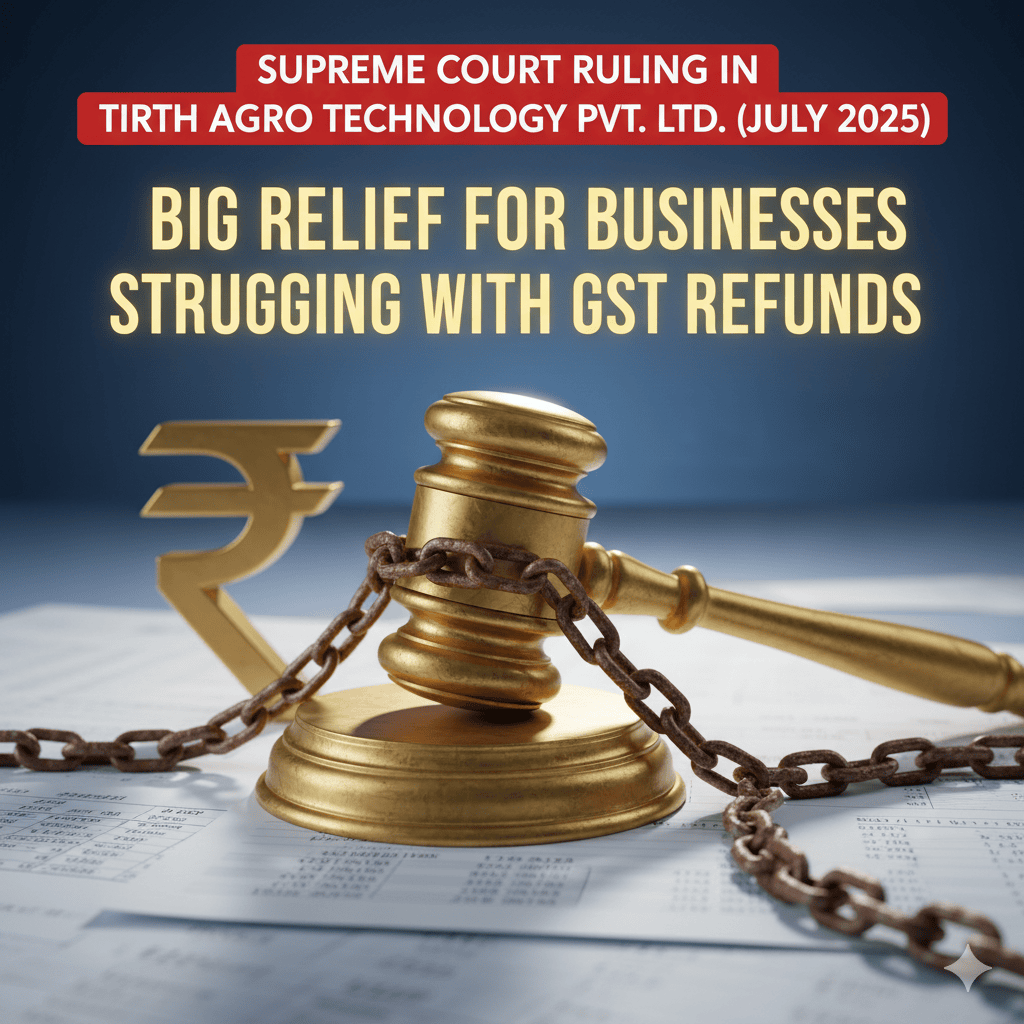🏭 What is the Problem of “Inverted Duty Structure”?
Normally in GST, the tax you pay on raw materials (inputs) can be adjusted against the tax you collect on sales (output).
👉 Example:
You buy cloth at 18% GST.
You sell stitched shirts at 5% GST.
This creates a mismatch:
You paid more GST on purchases.
You collected less GST on sales.
Result: You are left with extra tax credit (called Input Tax Credit or ITC) in your GST account.
This situation is called Inverted Duty Structure (IDS).

💰 Why Refund Matters
That extra ITC is basically your money stuck with the government.
If no refund is given, your working capital suffers.
For small businesses and manufacturers, this can be a big cash flow problem.
That’s why the GST law allows you to claim refund of unused ITC if the inverted duty structure applies
📜 What Does the GST Law Say?
Section 54(3) of CGST Act – allows refund of unutilized ITC in case of inverted duty.
Rule 89(5) of CGST Rules – explains the formula to calculate refund.
But there was a big confusion 👇
Earlier rules said only ITC on input goods (raw materials) can be refunded.
Refund of input services (like rent, security, transport, job work charges) was not allowed.
⚖️ The Confusion
In July 2022, the government issued Notification No. 14/2022.
It changed the formula for refund and gave clarity.
But the BIG question was –
👉 Does this change apply only from July 2022 onwards (prospective)?
👉 Or does it apply even to earlier refund claims (retrospective)?
Because of this confusion, many refund claims were denied by the GST department.
🏛️ Gujarat High Court’s Stand
In the case of Ascent Meditech Ltd., the Gujarat High Court ruled:
✔️ The amendment is clarificatory, not a new law.
✔️ That means it applies retrospectively.
✔️ Even refund claims relating to earlier periods (before July 2022) should benefit from this.
This was a huge win for taxpayers. But the government appealed in the Supreme Court.
⚖️ Supreme Court’s Decision – Tirth Agro Technology Pvt. Ltd. (July 2025)
The Supreme Court dismissed the government’s appeal.
👉 In simple words:
The Gujarat High Court ruling stands valid.
The amended refund formula applies to old as well as new claims.
Refund cannot be denied just because the application was filed after July 2022.
📌 What Does This Mean for Businesses?
This judgment gives massive relief to taxpayers:
✅ Old claims are valid – If your supplies were before July 2022, you can still claim refund even if you filed later.
✅ Rejected claims can be revived – If your refund was denied earlier because of “wrong formula” or “filed late”, you may appeal or reapply.
✅ Fairness ensured – You won’t lose money because of a technicality.
✅ Cash flow boost – Especially helpful for MSMEs and exporters who deal with thin margins.
📊 Example to Understand Better
Let’s take an example:
You manufacture solar panels.
Inputs (like parts, chemicals) taxed at 18% GST.
Finished product taxed at 5% GST.
Situation in 2021
You keep accumulating extra ITC because inputs are costlier in tax.
You apply for refund in 2023 (within 2 years, so valid).
What happened earlier:
Department rejected your claim saying – “New formula applies only after July 2022.”
Now, after SC ruling:
You are eligible for refund even though supplies were before July 2022.
📝 FAQs for Layman
Q1. Can I claim refund for old periods before July 2022?
👉 Yes, if your supplies were made earlier but you filed within 2 years, you can claim refund.
Q2. What if my refund was already rejected?
👉 You may file an appeal citing the Supreme Court ruling in Tirth Agro Technology Pvt. Ltd.
Q3. Do input services also qualify for refund now?
👉 The law is still tricky here – most refunds are for input goods only. But depending on your case, you may be able to include services if supported by ruling.
Q4. Is this only for Gujarat?
👉 No. The Supreme Court ruling makes it binding across India.
🔑 Final Takeaway
The Supreme Court in Tirth Agro Technology Pvt. Ltd. has given a historic relief.
It ensures that taxpayers get refunds they deserve and are not penalized by confusing rules.
👉 If you are a manufacturer, exporter, or MSME stuck with accumulated ITC, this judgment could put money back into your business.

